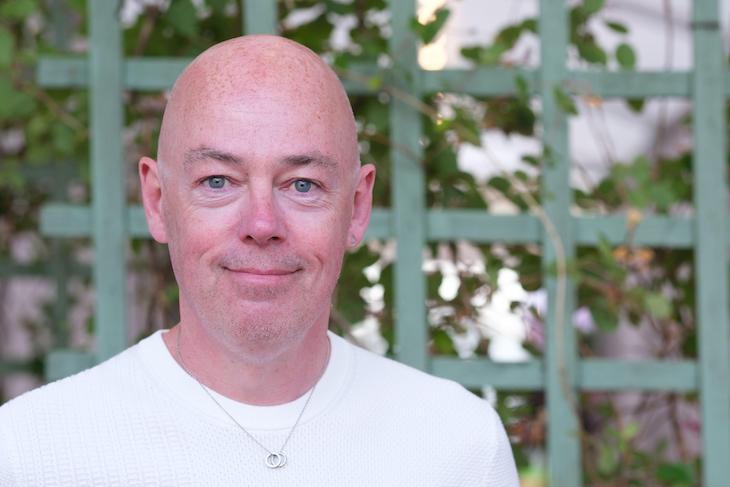John Boyne still doesn’t really know why he fell foul of the transgender mob. The author of The Boy in the Striped Pyjamas was attacked on social media and accused of ‘transphobia’ following the publication of his children’s novel, My Brother’s Name is Jessica, in 2019. The book came in for a kicking from trans activists. ‘No matter what I said or did, I was the devil incarnate,’ Boyne tells me.
The social media mob descended on Boyne
Five years on, Boyne remains baffled what the fuss was about. ‘There is no hatred in the book,’ he says. ‘It’s a book about acceptance. It’s a book about love. And I think they made a big mistake in not recognising that at the start, because the monstering that I came in for, if anything, turned my mind somewhat, from probably being 100 per cent on that side of the (trans activist) debate to somewhere else.’
Boyne says his motivation for writing a book with a lead character who is transgender stemmed from his own upbringing. Boyne grew up gay in Catholic Ireland during the 1970s and 1980s. Aside from having to cope with homophobia – and the fact that homosexuality was illegal – he was also sexually abused by a teacher. The man who attacked him would have been on trial in March of this year, but, says Boyne, ‘he died before we could get to the courtroom.’
Boyne’s difficult upbringing as something of an outsider made him sympathetic to trans people, but it was a conversation with a transwoman he knew that first made him decide to include a trans character so prominently.
‘As a gay man I’d been on the outside, so I was interested in [trans issues] and wanted to write about it for young people’, he says. However, he says he wanted to explore it from the perspective of the little brother ‘who has always seen his older brother as his hero, has always loved him, and doesn’t want anything to change’.
Trans activists didn’t see it that way though. They criticised Boyne for writing about an issue he didn’t have personal experience of. His detractors also accused him of misgendering the book’s title, saying that it should be My Sister’s Name is Jessica instead.
The social media mob descended on Boyne. They sought nothing less than his total cancellation. Luckily, they failed.
Boyne feels that he got through the ‘torture’ of that time fairly well, though it left him more determined to speak out about the LGBT alphabet soup. ‘Lesbian and gay people are same-sex attracted. Transgender people believe they’ve been born in the wrong body. There is no connection between those two things,’ he says. ‘You may as well say LGB and electricians or something,’ Boyne argues.
In The Echo Chamber, which was written as a farce and published in 2021, that voice can be heard clearly. ‘I wanted to show it all up, to just make people laugh out loud. All the pronouns and the virtue signalling, particularly from heterosexual middle aged men. And it’s probably got the best reviews of everything I’ve ever written,’ he says.
The positive reception was particularly welcome for Boyne, who has also been on the receiving end of fierce criticism for his most famous book, The Boy in the Striped Pyjamas. Critics accused the author of historical inaccuracies and even perpetuating myths about the Holocaust – allegations Boyne strongly denies. But while those attacks on the book were levelled soon after it came out in 2006, the transgender row seemed to breath new life into the fury.
Boyne thinks it is no coincidence that, about a year after My Brother’s Name is Jessica was published, more people began throwing more mud at The Boy in the Striped Pyjamas, 13 years after its publication.
‘I had been in Jewish community centres, synagogues, Holocaust memorial museums, all over the world for many years, with people who had far more understanding of this subject than I have,’ he says. ‘Nobody ever stood up and accused me of any of the things that I’ve been accused of online. I was just attacked for the sake of it. I do not understand the level of hatred that comes out of these people’s mouths and the desire to kind of destroy somebody’s career and their livelihood.’
The trans mob – and Boyne’s other critics – didn’t triumph. Earth, his latest book, is selling well and has been well received. While the last few years have been tough on Boyne, he seems more determined than ever. ‘I always knew I wanted to be a writer, and can’t remember a time when books and writing weren’t a part of my life,’ he says. ‘It just felt instinctive to me.’
As we approach the end of our conversation, the topic of ‘the holy month of Pride’, typically held in June, comes up. In his youth, he was afraid to go on Pride marches because of the homophobia directed by straight people on the street, whereas now, he says, ‘I’m afraid to go on Pride marches because of all the straight people in the march who would throw abuse [at the likes of me].’
Boyne will not be deterred by bullies. Nothing the haters have done will stop him from expressing his views, as I discovered to my delight. Long may he keep speaking out.
Julie Bindel interviews John Boyne for her podcast, which you can listen to here








Comments